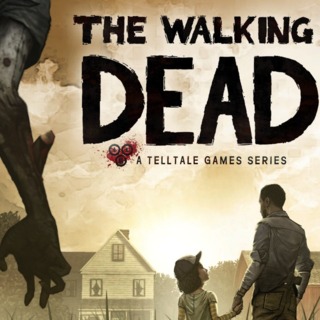The Walking Dead is based on Robert Kirkman's award-winning zombie apocalypse comic series (which also has a TV show). Developer Telltale Games specialise in episodic adventure games. Previous titles like Tales of Monkey Island stayed faithful to the point-and-click adventure style of game. Back To the Future had a larger emphasis on the story in comparison to Monkey Island, and Walking Dead lies further in that extreme.
Due to the emphasis on story, those looking for a challenging game should avoid because they won't find it here. You need to view the software as an interactive story, rather than a game to fully enjoy it. The good news is that the emphasis on story really pays off, because its nothing short of fantastic. Obviously, it becomes hard to review since you can't delve into the story too much, since that would be spoiling what the piece of software is all about.
The game opens up with Lee, a convicted murderer who is in the back-seat of a police car, engaged in conversation with the driver. They collide with a zombie and crash the car, killing the police officer in the process. Lee escapes and runs into the neighbourhood, where he meets 8 year old Clementine whose parents are away in a town called Savannah. Lee assumes the role of her guardian and so begins their journey of survival. Although you play as Lee, Clementine plays a huge part in the story.
All of the characters are well written and voice acting is brilliant which makes you feel more attached to them. This really works well since the decisions the game presents to you feel like they have a significant impact on the individuals and on the group.
The choices you have are really just an illusion of choice. If the choices did make an impact on the game, the entire story would be different which isn't really feasible for developers to achieve. It's mainly “you're damned if you do, damned if you don't” sort of choices. For example, you may be presented with a scenario where two characters are in danger. It's your choice who to save, but someone has to die. Later on in the game certain events will happen to the survivor, no matter who you save.
Your choices do affect the dialogue since characters will respond better to you if you have done them favours. The dynamic within the group of survivors is in such a way that your choice will please one individual but upset another. The group is together because they want to survive but not necessarily due to strong relationships. There's plenty of friction which leads to some drama, and it really feels like your decisions are really fuelling the arguments within.
For me, this is where the narrative really shines. You have to make decisions for the benefit of the group, for yourself, and for Clementine but you can't please anyone, so this triggers the arguments. The game is constantly trying to guilt trip you for your actions and really hammers home the consequences, really tugging on your heartstrings. Even when the arguments have died down, Clementine will come to you to talk about the events and ask you why they occurred. You could be open and honest about your decision, choose to lie, or explain that sometimes you have to do bad things in order to survive. Whatever you choose, you are gonna feel bad for either lying to a child, or exposing her to the horrors of life.
Along the course of the game, there are places where you must find an item or learn something about your surroundings in order for the game to progress. You can control Lee using the WASD keys, and use a combination of the mouse wheel and mouse clicks to make your selection (look, talk, pick-up, use etc). It's also compatible with a controller, using the control stick to move and face buttons for interaction.
The conversations usually have limited time to respond, which partially helps the conversation to have a more realistic flow, but also forces you make a quick decision under pressure. Saying nothing at all can also be an option.
Quick-time action sequences are used to deal with zombie attacks. Here you will hammer the Q key, and sometimes press E to finalise the scene. If you die, you can reload the last check-point which are saved at regular, logical intervals.
Throughout the episodes, you will be dealing with all sorts of dilemmas. There's plenty of mystery and conspiracy and you can draw comparisons with TV series like Lost. There's definitely some disturbing and unsettling scenes in the game (many big characters will die), alongside some very emotional scenes, particularly the ending. It's all testament to how well written the game is; that it can really play with your emotions.
The only criticism you could say with the story, is that it didn't really need an overarching plot. Just documenting the daily struggles of the group would be enough, so the 'evil' character in the final episode almost feels a bit shoehorned in. Looking at the overall story though, he is only really a minor part and just another person for Lee to deal with.
The game is split over 5 episodes, and after each one, your choices are summarised and you are shown statistics of everyone else's choices which makes for an interesting reading.
If you are looking for a great story/experience, Telltales' The Walking Dead is highly recommended as long as you can tolerate the themes within of course (it's rated 18 for a reason). It's not for those that want a traditional game, since the action is more visual, rather than involving; but it's a shame if you overlook it and miss out on the experience.

